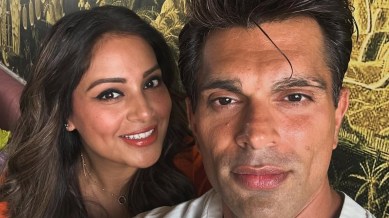📣 For more lifestyle news, click here to join our WhatsApp Channel and also follow us on Instagram
‘Nahin chalega divorce ho jaayega’: What Bipasha Basu’s take on husband Karan Singh Grover’s past marriages reveals about love beyond societal judgement
“This world is full of cynics, and thankfully, I have never been cynical no matter what has happened in my life,” said Bipasha Basu

When someone has been married before, it’s not unusual for their new partner to be asked whether that history concerns them. Actor Bipasha Basu was once asked this question in an interview with Times of India, where she shared, “It didn’t bother me and we spoke about it. I believe that everyone has a journey, and it is very easy for anyone to exclaim, ‘Oh, this is his third marriage, nahin chalega divorce ho jaayega (it won’t work and will end in divorce).’ I tell people that you have to be in someone’s shoes to know their story and understand their journey. This world is full of cynics, and thankfully, I have never been cynical no matter what has happened in my life.”
She added that for her, love and respect outweigh societal perceptions, stating, “I have always been a believer. And Karan is like that, too. I feel I am lucky, as I live only for love. And no man has given me more love and respect than Karan. I might not be looking for the same things in marriage that others do. I have my own checklist, and I have ticked my boxes accordingly. And I believe you can’t judge anyone for their bad relationships. I have had bad relationships, and I could have been easily married twice. The relationship could have been as deep, but I didn’t fall into the legality, and that is the only difference. You can’t condemn someone on the basis of a piece of paper.”
monthly limit of free stories.
with an Express account.
But, how can someone determine whether they are truly comfortable with their partner’s previous marriages or serious relationships?
Gurleen Baruah, an existential psychologist, tells indianexpress.com, “ It’s rarely black and white. You may think you’re fine with it, but certain situations — meeting an ex at a social gathering, hearing old stories– can stir feelings you didn’t expect.”
She continues, “What matters is how you respond when those feelings show up. Talk to your partner openly about their past experiences and what they learned from them. Emotional maturity is key here—for both people. You don’t have to have zero doubts; you just need to be able to process them without letting them quietly grow into resentment.”
Why do some people place more importance on emotional compatibility and personal checklists than on conventional marital expectations?
According to Baruah, it depends on the person, the couple, and the culture they’re in. In more individualistic societies, and among people with higher emotional awareness, personal values, shared worldview, and day-to-day compatibility often matter more than ticking traditional boxes like age, background, or “perfect” timing.
In more collectivist cultures, she believes that family expectations and social norms can carry more weight. “Most of us live at the intersection of these forces — balancing what feels right personally with what fits into our social world.”
Practical ways couples can protect their relationship from outside judgments or cynicism related to past relationships or divorces
“Keep your focus on what you’re building together. Be honest with each other about what’s private and what you’re comfortable sharing publicly. Create a strong foundation of trust so outside opinions don’t shake your sense of security. It also helps to surround yourself with people who support your relationship rather than feed doubts. And remember, every couple has its own history; what matters is how you live in the present, not how you explain the past to everyone else,” suggests Baruah.
📣 For more lifestyle news, click here to join our WhatsApp Channel and also follow us on Instagram